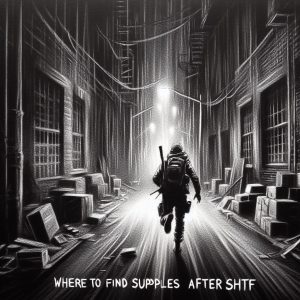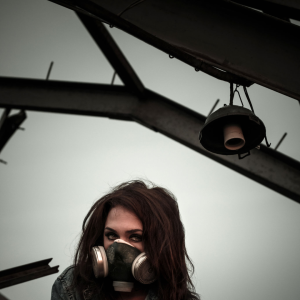Locations to Look for Supplies After the SHTF
Where to Find Supplies After SHTF: Some may think, “I’m a prepper; I won’t need to hunt for supplies. “I already have everything I need.” Maybe. Maybe not.
Even if you’ve been preparing for years, you may have overlooked a few details. Even if you don’t forget anything, you can find yourself in a circumstance where you need something you didn’t expect.
What happens if your shelter or vehicle is damaged? You may need to look for parts.
What happens if a critical piece of equipment is destroyed? You may need to look for a substitute.
What happens if your mother’s prescription pills are lost? You may need to hunt for substitute medications.
What if you had to admit a pregnant woman or a parent with a young child? You may need to look for infant formula.
These are just a few ideas I have. Once you’ve seen them, you will consider dozens of situations.
The concept is that if disaster strikes, you may have to forage for supplies. You won't have a choice if someone's life is in danger. But before I get into how to scavenge, I'd like to clear up any confusion about the difference between scavenging and looting.

Scavenging Is Not Looting
Following Hurricane Katrina, we saw videos of people sprinting down the street with jewellery and devices. Were they scavenging or looting? That is clear. Looters are not looking for stuff they need to survive; they merely take advantage of the situation.
Looters are aware that the stolen items will be missed. They know the owner will eventually return and realise what is missing. For these reasons, looters are much like other robbers.
Scavengers are not the same. They only look for things after the world as we know it ends, and they only take items that have been discarded or are unlikely to be detected.
Sometimes, you must miss meals or take medication, but it is okay if someone needs it to survive. Taking food or medicine directly from someone else's hands is another matter.
Some legalists feel that stealing is stealing regardless of the circumstances, but morality is more than a set of rules. Individuals who are terrified of ethically problematic circumstances will do poorly if the SHTF.
Send A Scout.
If you know the area you want to search, send a scout with binoculars, a radio, and a rifle.
Scouts should scan the area with binoculars for a few hours to confirm that no one lives there and that no bandits are waiting. It may sound paranoid, but some people become incredibly dangerous when there are no police to keep them in check.
You do not want to be robbed or killed when scavenging for supplies.
The radio keeps your scout in touch. If the location is unsafe or not worth the effort, the group's commander can instruct the scout to return or examine another area. If you lose contact with your scout, you'll know what's wrong and can dispatch reinforcements. The reinforcements must be cautious so they do not fall into traps.
It should be obvious what the scout’s gun is for.
When surveying the terrain, the scout should note any obstacles that could cause more trouble than they're worth. Examples include barbed wire fences, high walls, ditches, and streams. All of these variables may make it difficult or unsafe to return supplies.
The scout should look for signs that bombs or earthquakes have destroyed any structures. You don't want the stairs to collapse or a ceiling falling on you when digging through the rubble.
If you have local maps, thoroughly examine them to identify all the ways into and out of the area you want to search. Plan your journey carefully, and have alternate routes in case your principal route is closed down.
Before looking for a place, you and your group should weigh the costs, benefits, risks, and rewards. Is what you're looking for necessary to save someone's life, or is it something to make you feel better?
Make a plan.
After determining where to go and what to look for, you must decide who to send. Never send someone alone. They may have twisted an ankle or something and need assistance returning to camp. In addition, considerable hurdles or supplies may necessitate the movement of at least two individuals.
Remember that a single individual is far more likely to be robbed or killed than two or more. Ideally, you would send many personnel, but this is contingent on how many you have available. You don't want to leave children unaccompanied at your campsite.
Your group should include a toolset and a scavenging kit that contains bags, cordage, lock picks, cutting tools, a syphon, water jugs, and other items. I also recommend bringing respirators and goggles if the air is dusty or smokey.
If you have several regions to search, you must choose the order. To save energy, start further out and work your way back to camp.
If you know the heaviest objects will be at a particular spot, go there last. If scavenging your area will take several days or weeks, purchase a map and mark the locations you want to avoid accidentally visiting the same site twice.
Where to look?
Pretty much everywhere! Here are some potential targets and what you might discover within them.
Automotive Shops
You’re more likely to find the part you need here than at a department shop. It is true now and will be confirmed after the SHTF.
Cars
Look for any food, tools, or other essentials under the trunk, seats, and glove box. Additionally, auto components could be helpful. Suppose any member of your crew is mechanically inclined. In that case, you can use the upholstery as insulation and a bed, the wiring as cordage, the mirrors as signalling equipment, and the batteries as power sources and engine parts for your car.
Churches
I realise that taking materials from a church is completely bad. However, it is not theft if you are in an end-of-the-world situation and the church has been utterly abandoned. Churches that provide meals to the needy may have ample canned goods in the kitchen and closets.
Distribution Centres
Most people will go to food stores first, so it will take longer to clean the warehouses. Even so, some details may have been overlooked. Also, look out for the semi-trailers. You might discover nonperishable foods and other goods.
Fire stations
You might find food, supplies, and clothing. Furthermore, the fire engine includes a tank containing hundreds of gallons of water, which must be filtered.
Gas Stations
These will likely be picked clean, but you never know. It is worth a look.
Government Buildings
Most federal installations use commercial-grade solar panels. You might also locate backup lighting and emergency supplies.
Grocery stores
These will likely be picked clean, but you may locate food in less prominent locations, such as behind shelves, displays, and cash registers. Also, the restrooms, offices, stock area, and loading dock must be inspected.
Hospitals
This should include enough food, clothing, and medical supplies. Check every single closet and drawer.
Houses
Check everything—rooms, garage, basement, attic, backyard, storage sheds, garden (if there is one), etc. The water heater holds up to 70 gallons of drinking water. Better still, look for homes with swimming pools. Look for metal mailboxes, which can be turned into wood stoves.
Marinas
Inspect abandoned boats. They usually have emergency meals, communication equipment, fishing gear, and firearms.
Office Buildings
Look for vending machines in break rooms, food, and small tools on workstations. Most rooms should have fire extinguishers, and the janitor’s closet should contain cleaning supplies.
Pawn shops
If you’re lucky, you’ll discover guns, ammunition, and other random items. You might even uncover functional devices, like walkie-talkies or a ham radio.
Pet stores
If your pets are still healthy, a pet store may allow you to continue feeding them without giving up any of your food. You could eat it yourself, but I would only advocate it if needed. There are no FDA rules for pet food; overeating can make you sick.
Restaurants
These are probably going to be empty, but check anyhow. A few cans or bags of food were overlooked. However, anything stored in the freezer will have gone wrong.
Retail stores
See “Grocery Stores” above. Consider bringing non-electric entertainment, such as books, cards, board games, or sports equipment.
Schools
Schools contain many items, including tools, fire extinguishers, first aid kits, cleaning materials, and possibly food in the cafeteria. If you have time, you can open the lockers and check them. Specific snacks may have a lengthy shelf life.
Self Storage Facilities
It may be worthwhile if you have the time to pry open all of them. You’re unlikely to locate any food or perishable stuff, but you might come across some clothes, essential gear, and equipment.
The Article Where to Find Supplies After SHTF Appeared First On Survival Avenue.
The Article Where to Find Supplies After SHTF Was Found On https://limitsofstrategy.com


